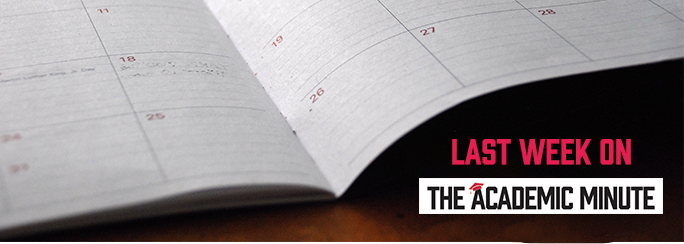The Academic Minute for 2024.04.01-2024.04.05

The Academic Minute from 4.01 – 4.05
Monday
Philip Powell – Indiana University Bloomington
Economic Impact of a Solar Eclipse
Executive Director of the Indiana Business Research Center and Associate Clinical Professor of Business Economics and Public Policy at the Indiana University Kelley School of Business. He is also an associate editor of Business Horizons, the Kelley School’s academic journal for management researchers and practitioners. Previously, Powell was Associate Dean of Academic Programs on the Indianapolis campus. Before joining the dean’s office, Powell was faculty chair of online graduate programs in Bloomington which earned a number one U.S. News & World Report ranking during his tenure. Powell has received.
Tuesday
Kimberly Rosvall – Indiana University Bloomington
What Can We Expect Animals to do During a Solar Eclipse?
Kimberly Rosvall is an Associate Professor in the Department of Biology at Indiana University Bloomington. She is also affiliated with IU’s internationally-recognized Program in Animal Behavior. Rosvall’s overarching research goal is to understand behavior in wild animals and why it varies within and among species. She has pioneered the true integration of how and why questions in animal behavior, combining muddy boots field biology with endocrinology and genomics. Recently, she applied these tools to a new combination of age-old and emerging questions that extend her work into behavioral evolution among bird species, stress resilience, and the physiological mechanisms that facilitate these phenomena. Current projects address: (1) How does natural selection build a complex trait like behavior? And, (2) Is behavior really on the front line of responding to novel environmental challenges? Rosvall received her PhD in Biology from Duke University, and her undergraduate degree in Biology from UCLA.
Wednesday
Hin Cheung – Indiana University Bloomington
How to Safely View a Total Solar Eclipse
Dr. Hin Cheung joined the Indiana University School of Optometry in July 2021 as a clinical assistant professor in primary care services at the Atwater Eye Care Center. Aside from clinical teaching, Cheung also teaches first-year ocular biology and serves as the coordinator of the primary care residency program.
He completed his undergraduate studies at University of Waterloo in 2010 and received his Doctor of Optometry with distinction from Ferris State University Michigan College of Optometry in 2014. He then completed his residency in ocular disease at Indiana University School of Optometry, followed by a Ph.D. in vision science in 2021 while working part time as an adjunct clinical lecturer teaching students in the clinic.
Thursday
Daniel Beverly – Indiana University Bloomington
How Several Minutes of Darkness Can Impact the Environment
Daniel Beverly is a Postdoctoral Research fellow at the O’Neill School of Public and Environmental Affairs at Indiana University Bloomington.
He received his PhD in Hydrological Sciences (focusing on Ecological Hydrology) from the University of Wyoming and a master of science in biology from the University of Northern Colorado. His research focuses on improving predictions of plant and ecosystem productivity through the use of hydrological and ecophysiological first principles. His work bridges leaf, whole-plant, and ecosystem processes by leveraging diverse empirical datasets and novel modeling approaches.
Friday
Catherine Pilachowski – Indiana University Bloomington
What to Expect During a Total Solar Eclipse
Professor Pilachowski holds the Kirkwood Chair in Astronomy at Indiana University Bloomington, where she teaches and conducts research on the evolution of stars and the chemical history of the Milky Way Galaxy from studies of chemical composition of stars and star clusters.
She served for more than 20 years on the scientific staff of the NSF’s National Optical-Infrared Astronomy research Laboratory in Tucson. While at NOAO, she served as Project Scientist for the design and construction of the 3.5-meter WIYN Telescope.
In addition to her astronomical research, Professor Pilachowski has been active in the areas of light pollution, astronomical instrumentation, large telescope design and construction, electronic publications, women in science, and diversity. She has served on numerous national and international boards and committees and as President of the American Astronomical Society from 2002-2004. She is a Fellow of the American Association for the Advancement of Science.
Professor Pilachowski received a B.S. in Physics from Harvey Mudd College in California, and her M.S. and Ph.D. from the University of Hawaii.


